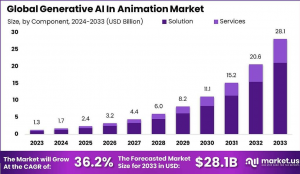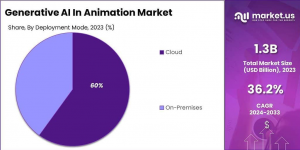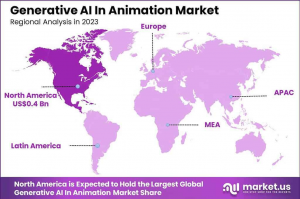Geographically, North America led the market in 2023, holding over 38% of the share with revenue amounting to USD 431.9 million...
In 2023, the cloud-based segment held a significant position in the Generative AI in the Gaming market, accounting for more than 65% of the market share...”
NEW YORK, NY, UNITED STATES, January 27, 2025 /EINPresswire.com/ -- The Global Generative AI in Gaming Market is experiencing rapid growth, projected to reach USD 11,106.6 million by 2033, up from USD 1,136.8 million in 2023, growing at a robust CAGR of 25.6% during the forecast period from 2024 to 2033. Several factors are driving this expansion.— Tajammul Pangarkar
The demand for AI-driven gaming experiences is growing, with players seeking more personalized and interactive gameplay. Generative AI technologies enable dynamic game environments, adaptive narratives, and realistic character behavior, significantly enhancing user experiences. As AI technology evolves, gaming studios are increasingly adopting these tools to create more immersive and responsive games, reducing production costs and time.
Technological advancements in machine learning and neural networks are allowing AI to generate content in real time, such as landscapes, quests, and characters, enhancing creativity while offering players more diverse and engaging experiences. This innovation is disrupting traditional game development processes, enabling more complex and dynamic games.
🔴 Click Here To Get a PDF Research Sample @ https://market.us/report/generative-ai-in-gaming-market/request-sample/
Additionally, the rise of cloud gaming and the shift towards subscription-based models have further fueled demand for AI-powered tools, as they allow for scalable and flexible game development. As these technologies mature, the Generative AI in Gaming Market is poised for substantial growth, offering significant investment opportunities and changing the landscape of the gaming industry.
➤ Key Takeaways
The Global Generative AI in Gaming Market is expected to reach USD 11,106.6 million by 2033, up from USD 1,136.8 million in 2023, reflecting a strong CAGR of 25.6% during the forecast period from 2024 to 2033.
In 2023, the cloud-based segment dominated the market, accounting for more than 65% of the market share. The nondeterministic segment also held a leading position, capturing over 61% of the share in the same year.
The Procedural Content Generation (PCG) segment remained significant in 2023, securing more than 30% of the market share, driven by its ability to dynamically generate expansive game worlds and scenarios.
Geographically, North America was the market leader in 2023, holding over 38% of the market share, with revenues reaching approximately USD 431.9 million. This dominance is attributed to the strong presence of major game developers and technology companies in the region.
🔴 Hurry Exclusive Discount For Limited Period Only @ https://market.us/purchase-report/?report_id=99021
➤ Experts Review
The Generative AI in the Gaming market is rapidly expanding, driven by government incentives and technological innovations. Governments are increasingly offering grants, subsidies, and funding programs to support AI research and development in the gaming industry, helping stimulate innovation.
This funding encourages the adoption of AI technologies that enhance gameplay and game development processes, making it easier for smaller studios to enter the market and for larger companies to innovate.
Investment opportunities in the market are abundant, particularly in AI-driven tools for procedural content generation and dynamic game environments. However, risks exist, including high development costs, intellectual property challenges, and data security concerns. As AI continues to disrupt traditional game development, investors must navigate these complexities carefully.
Consumer awareness of AI-generated content is on the rise, with players demanding more personalized, immersive gaming experiences. This shift is leading to greater acceptance of AI in gaming, though some concerns about the ethical implications of AI-generated content remain.
The technological impact of AI on gaming is transformative, enabling more responsive game worlds, adaptive narratives, and realistic character interactions. As AI tools continue to improve, they offer increased creative possibilities and production efficiencies.
In the regulatory environment, governments are beginning to establish guidelines on AI use in gaming, particularly around data privacy and content authenticity, which could shape the future of AI-powered gaming experiences.
🔴 Get a PDF Research Sample @ https://market.us/report/generative-ai-in-gaming-market/request-sample/
➤ Key Market Segments
By Deployment
On-premises
Cloud-based
By Type
Deterministic
Nondeterministic
By Application
Procedural Content Generation (PCG)
Automated Game Design and Testing
Visual Enhancements
AI-Driven Non-Playable Characters (NPCs)
Other Applications
➤ Report Segmentation
Technology: The market is primarily divided into machine learning (ML), deep learning (DL), and natural language processing (NLP). ML holds the largest share, as it powers various AI applications like procedural content generation, adaptive gameplay, and non-player character (NPC) behavior. Deep learning and NLP are growing segments, enhancing game realism by improving character interactions, voice synthesis, and dynamic storylines.
Application: Key applications of generative AI in gaming include procedural content generation (PCG), game design automation, and AI-driven narrative development. The PCG segment is particularly strong, with AI creating vast, complex game worlds dynamically, while game design automation streamlines repetitive tasks for developers. AI's role in narrative development is also increasing, enabling games to offer more interactive and personalized storylines.
End-User: The market serves gaming studios, independent developers, and cloud gaming platforms. Gaming studios are the primary consumers, investing in AI tools for enhancing game content and reducing production timelines.
Region: Geographically, the market is segmented into North America, Europe, Asia-Pacific, Latin America, and Middle East & Africa. North America leads, driven by strong gaming infrastructure and tech advancements, followed by Europe and Asia-Pacific, where AI adoption in gaming is accelerating.
🔴 Get the Full Report at Exclusive Discount (Limited Period Only) @ https://market.us/purchase-report/?report_id=99021
➤ Major Driving Factors
Drivers
The Generative AI in the Gaming market is driven by the increasing demand for immersive gaming experiences and personalized content. AI technologies enable dynamic, evolving game worlds, adapting gameplay to players' actions and preferences, which enhances engagement.
Additionally, advancements in machine learning and deep learning have significantly improved AI’s ability to generate complex, realistic game content. The rise of cloud gaming platforms is also a key factor, enabling scalable and accessible AI tools for developers. Furthermore, government incentives and funding for AI research in gaming help fuel innovation and adoption.
Restraints
Despite the growth, the market faces high development costs associated with implementing advanced AI technologies. The complexity of AI systems also makes integration into existing game development pipelines challenging. Additionally, concerns around data privacy and security regarding AI-generated content could limit widespread adoption.
Challenges
A major challenge is the ethical implications of AI-generated content, particularly regarding ownership, intellectual property, and deepfakes in gaming. Moreover, there is a shortage of skilled professionals with expertise in AI, which could hinder the pace of innovation and adoption.
Opportunities
The market offers significant opportunities in cloud-based AI tools, AI-driven game customization, and procedural content generation. As AI becomes more advanced, developers can create richer, more interactive game environments and personalized experiences. Additionally, expanding markets in Asia-Pacific present growth potential for AI-powered gaming solutions.
➤ Key Player Analysis
The Generative AI in the Gaming market features several major players driving innovation and market growth. NVIDIA is a key leader, offering powerful GPU technology essential for AI-powered gaming applications like real-time rendering and procedural content generation. Their CUDA platform accelerates deep learning and gaming workloads, making them a vital player in the AI gaming space.
Adobe is another prominent player, providing AI-powered tools such as Adobe Sensei, which assist in automating tasks like character modeling, animation, and scene generation. These tools help game developers streamline workflows and enhance creative processes.
Unity Technologies and Epic Games also play a crucial role, with their game engines Unity and Unreal Engine integrating AI-driven features for more immersive and dynamic gaming experiences. They support procedural content generation and advanced AI-based character behavior, making them indispensable to the gaming industry.
Emerging players like Runway and DeepMotion are innovating by offering cloud-based, AI-powered animation and game design tools, democratizing access to AI technologies for smaller studios. These companies are significantly contributing to the market's rapid evolution, driving further adoption of AI in gaming.
➤ Top Key Players in the Market
NVIDIA Corporation
Unity Technologies
Luma AI Inc.
IBM
Charisma.ai
Masterpiece Studio
ZibraAI, Inc.
DeepMotion
Character Technologies, Inc.
Kinetix
Latent Technology
➤ Recent Developments
Recent developments in the Generative AI in the Gaming market have marked significant advancements in AI integration. NVIDIA launched its RTX 40 series GPUs, optimizing gaming experiences with real-time AI rendering and enhanced performance for procedural content generation. Unity Technologies introduced AI-based tools in its Unity engine, enabling developers to create dynamic, AI-driven game worlds and non-playable characters (NPCs) with realistic behavior.
Similarly, Epic Games integrated AI-powered procedural generation tools in Unreal Engine, streamlining game development and enhancing creativity. Emerging platforms like Runway and DeepMotion are democratizing access to AI tools by offering cloud-based solutions for independent game developers. Additionally, advancements in AI-generated voice synthesis and interactive narratives are pushing the boundaries of immersive gaming experiences.
➤ Conclusion
The Generative AI in the Gaming market is rapidly expanding, driven by technological innovations and increasing demand for immersive, personalized gaming experiences. Key players like NVIDIA, Unity, and Epic Games are leading the way in integrating AI technologies into game development, enhancing both creativity and production efficiency.
As AI continues to evolve, the gaming industry is poised to experience transformative changes, offering significant growth opportunities for developers and investors. Despite challenges, the future of AI in gaming looks promising, with endless possibilities for game design and player engagement.
➤ Explore Other Interested Topics
Embedded Finance Market - https://market.us/report/embedded-finance-market/
AI-Powered Storage Market - https://market.us/report/ai-powered-storage-market/
Semiconductor Foundry Market - https://market.us/report/semiconductor-foundry-market/
AI in Edtech Market - https://market.us/report/ai-in-edtech-market/
AI in Mobile Apps Market - https://market.us/report/ai-in-mobile-apps-market/
Drone Taxi Market - https://market.us/report/drone-taxi-market/
Wearable Technology Market - https://market.us/report/wearable-technology-market/
Text to Speech Market - https://market.us/report/text-to-speech-market/
Artificial Intelligence as a Service Market - https://market.us/report/artificial-intelligence-ai-as-a-service-market/
Internet of Things (IoT) Market - https://market.us/report/internet-of-things-iot-market/
Lawrence John
Prudour
+91 91308 55334
Lawrence@prudour.com
Visit us on social media:
Facebook
LinkedIn
Legal Disclaimer:
EIN Presswire provides this news content "as is" without warranty of any kind. We do not accept any responsibility or liability for the accuracy, content, images, videos, licenses, completeness, legality, or reliability of the information contained in this article. If you have any complaints or copyright issues related to this article, kindly contact the author above.




